Related Research Articles

The Bee Gees were a musical group formed in 1958 by brothers Barry, Robin, and Maurice Gibb. The trio were especially successful in popular music in the late 1960s and early 1970s, and later as prominent performers in the disco music era in the mid-to-late 1970s.

Maurice Ernest Gibb was a British musician. He achieved worldwide fame as a member of the pop group Bee Gees. Although his elder brother Barry Gibb and fraternal twin brother Robin Gibb were the group's main lead singers, most of their albums included at least one or two songs featuring Maurice's lead vocals, including "Lay It on Me", "Country Woman" and "On Time". The Bee Gees are one of the most successful pop-rock groups of all time.

Cucumber Castle is the seventh studio album by the Bee Gees, released in April 1970. It was produced by Barry Gibb, Maurice Gibb, and Robert Stigwood. It consists of songs from their television special of the same name, which was named after a song on their 1967 album Bee Gees' 1st. Cucumber Castle is the only Bee Gees album not to feature any recorded contributions from Robin Gibb, as he had left the group before the album was recorded.
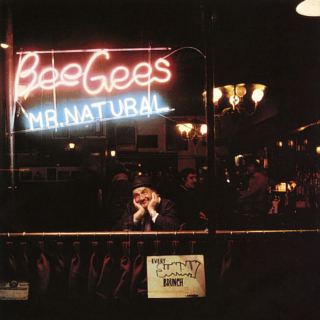
Mr. Natural is the twelfth studio album by the Bee Gees, released in 1974. It was the first Bee Gees release produced by Arif Mardin, who was partially responsible for launching the group's later major success with the follow-up album Main Course. The album's rhythm and blues, soul, funk, and hard rock sounds initiated the group's reinvention as a disco and blue-eyed soul act, which would solidify on subsequent albums. However, Barry Gibb has said that the album was "whiter" than Main Course. The cover photograph was taken at 334 West 4th Street, Greenwich Village, New York City by Frank Moscati, which is today known as The Corner Bistro tavern.
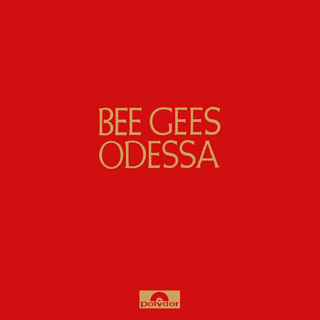
Odessa is the sixth studio album by the Bee Gees, a double vinyl LP released in February 1969, initially in an opulent red flocked cover with gold lettering. Despite reaching the UK Top Ten and the US Top 20, the album was not particularly well-received, though now is regarded by many as the most significant of the group's Sixties albums. An ambitious project, originally intended as a concept album on the loss of a fictional ship in 1899, it created tension and disagreements in the band regarding the work's direction; finally, a dispute over which song to release as a single led to Robin Gibb temporarily leaving the group.
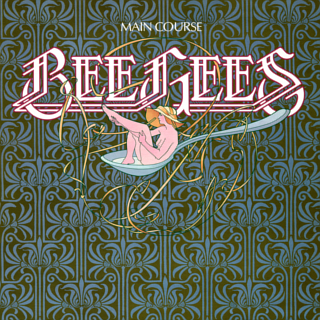
Main Course is the thirteenth studio album by the Bee Gees, released in 1975 by RSO Records. It was the group's last album to be released by Atlantic Records in the US under its distribution deal with Robert Stigwood. This album marked a great change for the Bee Gees as it was their first album to include mostly R&B, soul and funk-influenced songs, and created the model for their output through the rest of the 1970s. It rejuvenated the group's career and public image, particularly in the US, after the commercial disappointment of their preceding albums. Main Course was the first album to feature keyboardist Blue Weaver who had just left the Strawbs and toured with Mott the Hoople. The album cover with the band's new logo designed by US artist Drew Struzan made its first appearance here.

The Bee Gees Sing and Play 14 Barry Gibb Songs is the debut studio album by the Bee Gees. Credited to Barry Gibb and the Bee Gees, it was released in November 1965 on the Australian Leedon label. It is largely a compilation of most of the Gibb brothers' singles that had been released over the previous three years in Australia, which accounts for the many different styles of music on it.
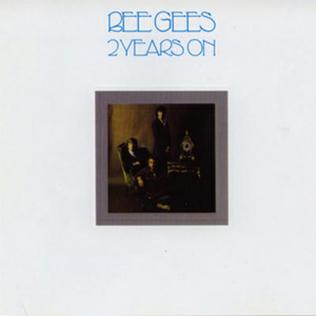
2 Years On is the eighth studio album by the Bee Gees, which reached No. 32 on the US charts. Released in 1970, the album saw the return of Robin Gibb to the group after an earlier disagreement and subsequent split following Odessa. 2 Years On was the first album with drummer Geoff Bridgford, who remained a full-time member of the group until 1972 although he was not pictured on the sleeve. The best-known track is "Lonely Days". Released as the first single by the reunited brothers, it charted high in the US, but peaked at No. 33 in the United Kingdom.

Life in a Tin Can is the Bee Gees' eleventh studio album, released in January 1973.
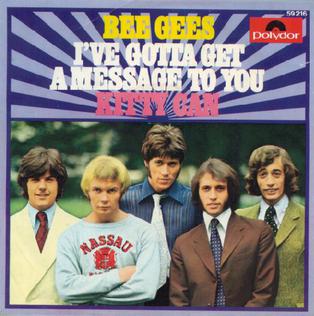
"I've Gotta Get a Message to You" is a song by the Bee Gees. Released as a single in 1968, it was their second number-one hit in the UK Singles Chart, and their first US Top 10 hit. Barry Gibb re-recorded the song with Keith Urban for his 2021 album Greenfields.
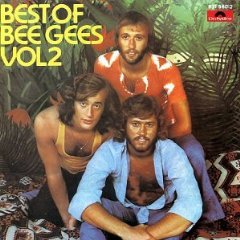
Best of Bee Gees Vol. 2 is a compilation album of hits by the Bee Gees released in 1973. The album, briefly revived on CD in the late 1980s, went out of print, but was reissued by Rhino in November 2008.

Here at Last... Bee Gees... Live is the first live album by the Bee Gees. It was recorded on December 20, 1976 at the LA Forum and was released in May 1977 by RSO Records. It reached No. 8 in the US, No. 8 in Australia, No. 1 in New Zealand, and No. 2 in Spain.

"Wouldn't I Be Someone" is a song by the Bee Gees. It was released on 22 June 1973 in the United Kingdom and in July 1973 in the United States. The photo on the cover of the single was also used on Best of Bee Gees, Volume 2.
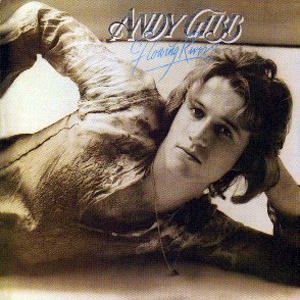
Flowing Rivers is the debut studio album by English singer-songwriter Andy Gibb. The album was produced by Albhy Galuten and Karl Richardson, with Barry Gibb on two tracks. It was released in September 1977 on RSO. Flowing Rivers was re-released by Polydor Records in 1998 in CD version.

"Boogie Child" is the third hit single from the Bee Gees' 1976 platinum album Children of the World, released in the US in early 1977. The song peaked at no. 12 on the Billboard Hot 100 as an A-side and was then used as the B-side of the single "Children of the World" in the UK. It was the last song recorded by the Bee Gees for their album Children of the World.
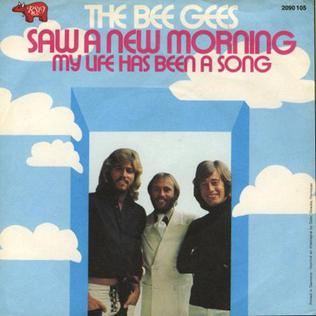
"Saw a New Morning" is the 1973 single released by the Bee Gees. It was also the group's first single released on Robert Stigwood's newly created records label RSO Records. The Bee Gees moved to Los Angeles in 1972 to record the album Life in a Tin Can which was a new direction for the group, who had been recording in England since 1967. The B-side, "My Life Has Been a Song" features lead vocal by Robin Gibb as well as Barry Gibb.

The Kid's No Good was to have been the debut solo album by British musician Barry Gibb following his departure from the Bee Gees in December 1969. There was no official title given to the album at the time. The line "the kid's no good", which the album is commonly titled on several bootleg releases, is also featured in the Bee Gees song "Come Home Johnny Bridie" on the 1973 album Life in a Tin Can. The album features orchestral arrangements by Bill Shepherd who performed the same role for the Bee Gees from 1965 to 1972.
"Kitty Can" is a song by the Bee Gees, composed by Barry, Robin and Maurice Gibb. It was released as the B-side of "I've Gotta Get a Message to You" in July 1968, and as the second track on the album Idea in September 1968. In 1973, RSO Records released a compilation called Kitty Can only in Argentina and Uruguay, and this song appeared as the first track on that album.

Kitty Can is a compilation album by the Bee Gees, released only in South America on RSO Records.
References
- ↑ "Gibb Songs : 1972". Columbia.edu. Retrieved 23 August 2012.
- ↑ "Gibb Songs : 1973". Columbia.edu. Retrieved 23 August 2012.
- ↑ "Bonnet Rocks: Discography – UK Singles". Archived from the original on 30 October 2013. Retrieved 18 December 2011.
- ↑ Allmusic.com – Percy Sledge: Shining Through the Rain